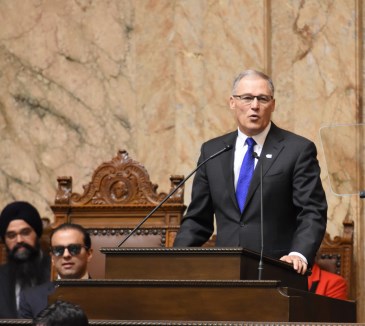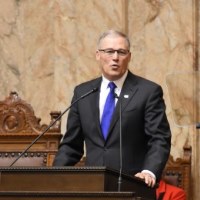— from the Office of Washington State Governor Jay Inslee —

Governor Jay Inslee addresses the State Legislature in his “State of the State” address on Jan. 9, 2018
Gov. Jay Inslee today [Jan. 9, 2018] delivered his 2018 State of the State address, a speech that highlighted Washington’s strong economy and best-in-the-nation business climate saying “our economy is strong, our future is bright, but there are always new heights to reach, new challenges to overcome and persistent wrongs to right.”
Inslee called on legislators to “forge a prosperous path for the next generation.” He laid out a series of measures he hopes legislators will act on in the 60-day session:
- fund the final step of McCleary in time for the 2018–19 school year;
- expand youth apprenticeship opportunities and career-connected learning;
- approve an overdue capital budget necessary to fund hundreds of crucial projects related to school construction, housing, mental health and more;
- expand access to democracy by passing voter rights and registration bills;
protect net neutrality; - expand women’s health care rights;
- ensure Dreamers’ abilities to pay for college are not damaged by Congress’ refusal to renew their deferred-action status;
- ban bump stocks, close the background-check loophole on semi-automatic rifles and require safe storage of firearms;
- and put an end to the state’s death penalty.
The governor then turned his attention to an urgent crisis he says the Legislature has yet to tackle — climate change.
“The Legislature recognized this threat a decade ago when it pledged to the people of Washington that we would make our air cleaner and reduce carbon pollution,” Inslee said, referring to legislation passed in 2008 that set specific targets for greenhouse gas emissions. “But unless we act now, that promise will be broken.”
Gov. Jay Inslee delivers his 2018 State of the State address in the House chambers in Olympia on Jan. 9, 2018. (Official Governor’s Office Photo)
Inslee pointed to the Legislature’s work in recent years to tackle transportation and basic education funding as evidence it is now ready to take on its obligation to make Washington’s air cleaner and reduce emissions.
“Now is the time to join in action and put a price on carbon pollution. Doing so will allow us to reinvest in all the things that drive down emissions… and by doing these things, we can save our forests. We can help rural economies. We can protect our waterways.”
Inslee’s carbon tax proposal: drive down emissions and reinvest in creating clean-energy jobs
Carbon pricing is in place in about 60 countries and other jurisdictions around the world covering half of the global economy, and is being implemented by a growing number of U.S. states. Ten states currently have carbon pricing or cap-and-trade measures in place, including California. Six states — including Washington and Oregon — are currently considering proposals.
Inslee’s proposal announced today ends the unfettered release of carbon pollution by setting a price on carbon emissions. Under his proposal, more than 75 percent of the carbon tax would be reinvested in a range of emission-reducing and job-creating programs such as helping more people pay for energy-saving insulation in their homes, incentivizing further use of electric vehicles and buses, building more solar panels, supporting development of other clean energy technology, as well as updating irrigation and water management systems.
Emissions generated by transportation fuels and power plants would initially be taxed at $20 a ton, starting July 1, 2019. The tax rate would increase annually by 3.5 percent plus inflation. The tax would generate an estimated $1.5 billion in new revenue over the first two years and an estimated $3.3 billion over the next four years.
The four primary areas of carbon reinvestment include:
- Energy transformation: Fifty percent of the revenue would support clean energy and transportation programs to bolster Washington’s already strong clean energy economy. Examples include grants to purchase electric buses and electric vehicle charging stations, expansion of production of renewable transportation fuels, and residential and utility-scale renewable energy.
- Water and natural resources resilience: Thirty-five percent of the revenue would pay for improvements to Washington’s flood management and stormwater infrastructure, irrigation systems and culverts, and forest health.
- Transition assistance: Fifteen percent of the revenue will help lower-income households and vulnerable communities transition to a clean energy economy, including making their homes more energy efficient to help lower their energy costs and help workers transition to a low-carbon economy through job training and other assistance.
- Clean energy investment: Electric and natural gas utilities will be eligible for a tax credit based on their investments in measures and policies that reduce their emissions such as additional EV infrastructure, use of renewable energy, or development and commercialization of emission-reducing technologies. Funding would also be provided to help low-income customers pay their energy bills.
Inslee has been working with legislators and leaders from the business, labor, tribal and environmental communities to craft a Washington-focused program that tackles climate change and establishes Washington’s leadership role in the growing decarbonized, clean-energy economy.
The question is no longer whether the time is right to fight climate change, but how.
Even Republican leaders are expressing an openness to carbon pricing and action. Minority House Leader Dan Kristiansen announced last week his members are working on a carbon proposal of their own.
**If you are reading theOrcasonian for free, thank your fellow islanders. If you would like to support theOrcasonian CLICK HERE to set your modestly-priced, voluntary subscription. Otherwise, no worries; we’re happy to share with you.**







